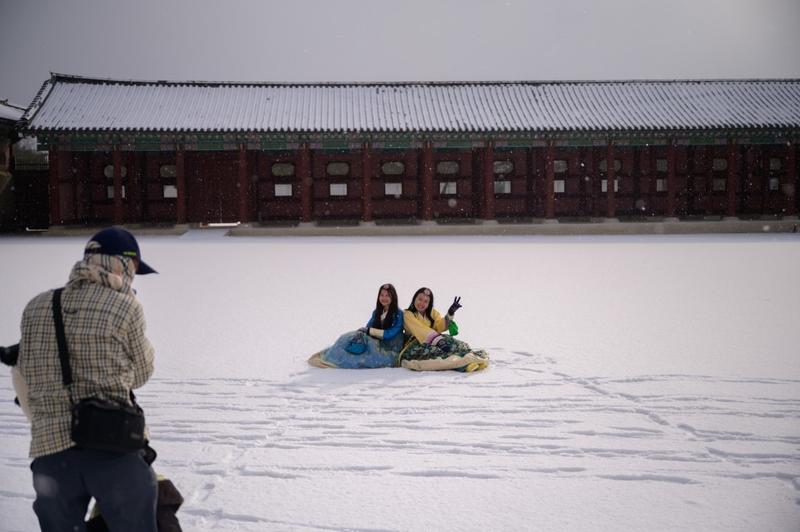 Tourists wearing traditional hanbok dress pose for photos in the snow at Gyeongbokgung palace in Seoul on Feb 17, 2020. (ED JONES / AFP)
Tourists wearing traditional hanbok dress pose for photos in the snow at Gyeongbokgung palace in Seoul on Feb 17, 2020. (ED JONES / AFP)
SEOUL - With South Korea’s ski resorts closed in recent weeks to help combat COVID-19, heavy snowfalls have led to a surge in sales of sledges as winter sports lovers look for family friendly snow slopes close to home.
Major retailers have run out of stocks of plastic sledges, with E-Mart, the country’s biggest supermarket chain, selling nearly 2,200 sledges in six days, more than three times its total 2020 sales.
Competitor Lotte Mart said sales of sledges in the first six days of January were up more than six-fold from the same period last year and is also completely out of stock.
Major retailers have run out of stocks of plastic sledges, with E-Mart, the country’s biggest supermarket chain, selling nearly 2,200 sledges in six days, more than three times its total 2020 sales
ALSO READ: COVID-19 rules divide adjacent French, Swiss ski resorts
One family that visited the Olympic Park in Seoul said they had to bring picnic mats for their children the slide on.
“We tried to buy sledges yesterday but couldn’t find one, so we brought these mats as substitutes. It’s still great that our kids can enjoy sledding and that we have a place near home where it can replace the sledding parks,” said Joe Choong-hyun, a father of two boys.
After heavy snowfalls earlier in the week, children played outdoors even as the temperature in Seoul plummeted to -18.6 Celsius (-1.5 Fahrenheit) on Friday, the coldest in 35 years.
“I’m happy that the snow is still piled up so I can make more snowmen and have snowball fights,” said 11-year-old Kim Ha-jin, who was sledding on a small slope.
READ MORE: Ski resorts see recovery on horizon
A photo of a person snowboarding on a snow covered road in the middle of Seoul went viral on Twitter, while a Youtuber who posted a video of himself skiing around his town scored nearly 43,000 views.
Ski resorts, meanwhile, resumed business earlier this week, but only with limited capacity and operating hours, following a cluster of infections at a resort in Pyeongchang county, site of the 2018 Winter Olympics.


